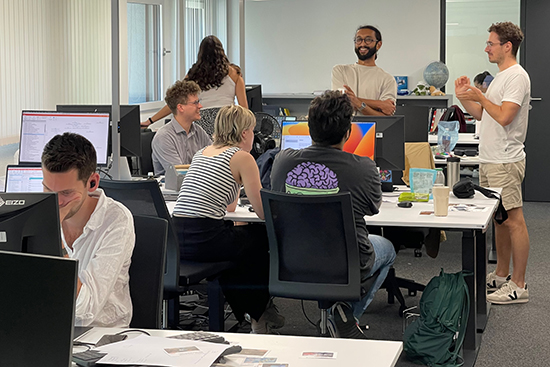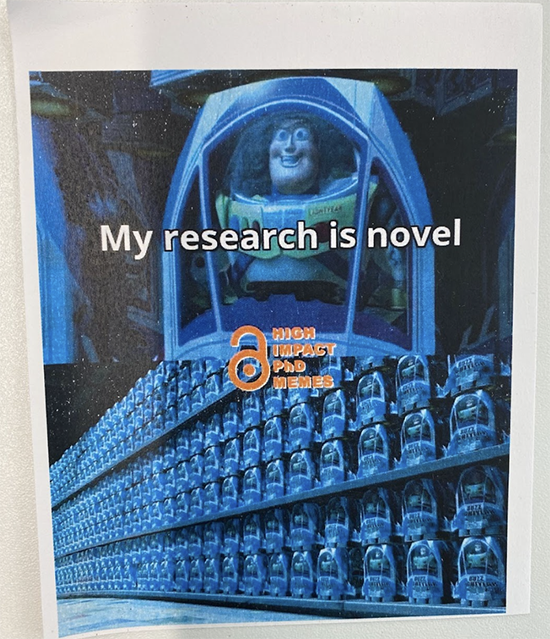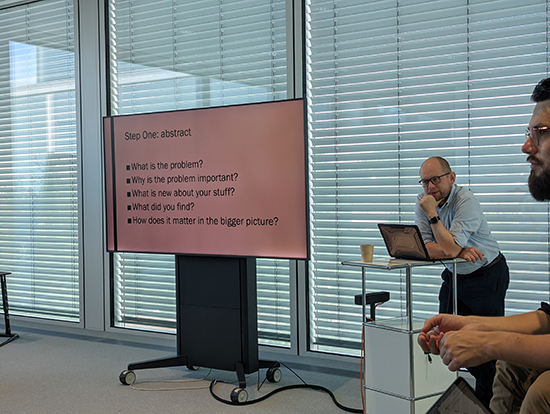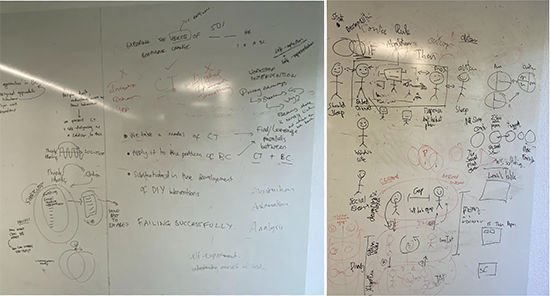Authors: Ava Elizabeth Scott, Leon Reicherts, Evropi Stefanidi
Posted: Tue, April 16, 2024 - 10:30:00
The deadline for the CHI conference is an important event on an HCI researcher’s calendar. For CHI 2023, more than 3,000 papers were submitted and only 28 percent were accepted. With such a high number of submissions and low acceptance rate, researchers face pressure to make the best submission possible. So how can we best introduce early-career researchers to the charms and quirks of writing a CHI paper while supporting them in submitting the best possible paper they can?
For the past two years, the University of St. Gallen in Switzerland has hosted a writing retreat called CHI Together, which brings researchers together for two and a half weeks directly prior to the CHI deadline. While many of these researchers are experienced CHI authors, some are engaging in this process for the first time. During the inaugural writing retreat held in 2022, attendees submitted a total of a dozen papers. The idea behind the retreat was to help participants collaborate efficiently and manage the stressful phase before the deadline in the company of like-minded people; and then to celebrate their submissions. Hoping to reiterate and build on this success, this year the computer science department at St. Gallen invited 21 researchers to come together, physically and collaboratively, in the run-up to the deadline for CHI 2024.
This endeavor was made possible by funding from the SIGCHI Development Fund and from the University of St. Gallen. We are hugely grateful for this support, which facilitated the many healthy social activities and group meals, as well as financed accommodation and travel expenses. Here we describe these activities, starting from our first day arriving in St. Gallen to the final delirious day of submissions and subsequent celebration. We then reflect on the intensity of the CHI deadline and recommend that early-career researchers be supported with social and recreational resources, as well as pragmatic and technical measures.
Arriving by plane and train on a warm day in late August, we were immediately struck by the fact that these services were on time. As students from the U.K. and Germany, Swiss timeliness is always a nice surprise. We reunited with the other visiting researchers, new and familiar faces alike. Our apartments were a 10-minute walk from the computer science building in the center of St. Gallen, halfway up a steep hill. While it was an easy jaunt down to the office, there was a significant disincentive to leave the office: the hike between you and your bed. Though this felt like a slog at the time, the daily exercise surely benefited us. These apartments were our home for the next two and a half weeks, but we spent much more time at the office.

Sharing an open office environment catalyzed natural collaboration, as well as companionship and social breaks during the workday.
In the computer science building, we each had desk space with a display monitor and a comfortable chair. In anticipation of the numerous hours we would spend writing, an ergonomic setup was a priority. In this open office setting, students collected data, analyzed it, and scratched their heads debating over the structure and presentation of their results.

A selection of irreverent and humorous Ph.D. memes were spread over the desks.
Knowledge exchange sessions were organized to support these processes, including sessions on qualitative analysis and how to write a CHI paper. We swapped abstracts and drafts with one another to get feedback on our efforts. In addition to receiving guidance on analysis and writing, we also created and shared analytical tools, such as a transcription and speaker-segmentation pipeline, which we used to transcribe more than 100 interviews across different research projects. Using the wall-size whiteboards around the office, we collectively sketched and resketched papers’ structure, argumentation, models, and figures. By distributing our thinking across multiple brains and the physical space, we could work through hard problems with greater speed and clarity.
This intensive brain activity required fuel. Most days, we took turns making group lunches in the lab kitchen—usually an elaborate salad with fresh bread and cheese. By sharing lunch duties, we reduced the overall time spent on meal preparation, while also eating well. As the deadline got closer and the days became longer, we frequently honored the tradition of grabbing doner kebab or Thai takeaway for dinner.

Paweł W. Woźniak presented the key elements of an abstract.
There were also several optional activities that provided a much-needed break. We hiked the nearby mountains, took a dip in the local mountain lakes, indulged in manic dance and workout breaks, went to the cinema, and shared pizza and burgers in the evenings. Furthermore, a contingent of researchers attended the Mensch und Computer conference in nearby Rapperswil, enabling further exchange with the D-A-CH (Germany, Austria, and Switzerland) HCI community. Postdocs and those in their final year of Ph.D. research also attended an information session about research funding opportunities across Switzerland and the rest of Europe, organized by the research office at St. Gallen. This balance of intellectual, recreational, and forward-looking activities helped balance the otherwise intensive writing schedule.
Immersed in this culture of dedicated focus, we collectively submitted more than a dozen papers for CHI 2024. One supervisor said that their students’ writing during this period was the clearest and most effective of their studies so far. While some of us were clicking the submit button at the very last moment (2 p.m. on September 15 in our time zone), we all got our papers in on time and celebrated with drinks and snacks in the lab. Despite many of us having pulled all-nighters, the drinks continued until 2 a.m. We said heartfelt goodbyes, and left for our respective destinations the following morning, looking forward (with slight trepidation!) to receiving our reviews in a few weeks.

The collective whiteboards were the site of active collaborative thinking, sketching iterations of models, figures, and argumentation.
Large, top-tier conferences such as CHI are the critical sites for presenting work, receiving feedback, and networking with peers and future collaborators. However, due to the appropriately high standards set for paper acceptance and the cost of in-person attendance, such conferences are not always accessible to early-career scholars. The CHI Together model of collaborative writing before the deadline provides support in multiple ways, offering an encouraging, knowledgeable community to help steer research work and frame completed work following best practices for different submission types. CHI Together also supports recreational activities that allow early-stage scholars to network and build community; we believe that such community building means scholars will have an established cohort for continued mutual support in their everyday work setting as well as at conferences, when they are able to attend them. These meaningful relationships with peers are perhaps even more lasting than connections made at conferences.
Plans for CHI Together 2024 are in the works, potentially hosted elsewhere in Europe, but aiming to maintain the same level of focus, support, and solidarity in the run-up to the deadline for CHI 2025. For those of you interested in hosting a similar writing retreat, and who would appreciate some guidance or blueprints, don’t hesitate to get in touch with us or Johannes Schöning of the University of St. Gallen. Or if you are running similar events, please do share your approach with us.
Posted in: on Tue, April 16, 2024 - 10:30:00
Ava Elizabeth Scott
View All Ava Elizabeth Scott's Posts
Leon Reicherts
View All Leon Reicherts's Posts
Evropi Stefanidi
View All Evropi Stefanidi's Posts







Post Comment
@jzexport (2024 06 10)
@basket random there were a number of elective activities that offered a much-needed respite.
@William (2024 06 20)
It sounds like the CHI Together writing retreat was a fantastic experience! The combination of collaborative work, social activities, and support seems like a winning formula for early-career HCI researchers. Kudos to the University of St. Gallen and the SIGCHI Development Fund for making it possible.
@Michael Marsh (2024 06 24)
We drew and resketched papers’ structure, drift hunters, arguments, models, and figures on office wall-size whiteboards.
@breshia (2024 06 30)
The CHI Together writing retreat at the University of St. Gallen is an excellent example of how institutions can support researchers in the most demanding phases of their career. By providing a collaborative environment and social resources, we not only managed to improve the quality of the submitted articles, but also strengthened the community of researchers folleto sams club
@tiences (2024 07 02)
The CHI Together retreat appears to be a well-rounded initiative, providing not just academic support but also a supportive social environment. The blend of collaborative work sessions and social activities must have helped foster a strong sense of community among participants. It’s great to see tunnel rush!
@AlinaHabba24 (2024 07 05)
My graduate students always enjoy Sketching. It looks easy but it’s quite difficult. I also recommend the final grade calculator for calculating scores.
@Marites (2024 07 05)
Though this felt like a slog at the time, the daily exercise surely benefited us.
https://www.dfwbathroomremodeling.com/
@Jenny (2024 07 08)
This high-level mental work needed nourishment. Every day, we alternated in preparing group lunches in the lab kitchen, which were often complex salads topped with fresh cheese and bread. See: nyc engagement photographers
@efrenboyer (2024 07 12)
Try it now to experience the fun that Friday Night Funkin brings.
@Neal fun (2024 07 12)
Is a delightful website filled with a diverse collection of interactive and entertaining activities. From mind-bending puzzles to creative games, Neal Fun offers something for everyone looking to challenge their wits or simply unwind with engaging content. Explore their array of games and puzzles at Neal Fun and discover a world of fun waiting to be enjoyed!
@seo service london (2024 07 16)
After reading your article I was amazed. I know that you explain it very well. And I hope that other readers will also experience how I feel after reading your article seo service london
@shopthehotdeals (2024 07 16)
Can I say what relief to find someone who really knows what theyre discussing on the net. You definitely have learned to bring a difficulty to light making it important. The diet should look at this and understand why side on the story. I cant believe youre less common simply because you definitely possess the gift. shopthehotdeals
@more info (2024 07 16)
Composed of 20 clinically tested components known for enhancing blood circulation, ZenCortex’s formula promotes inner ear well-being. Each ingredient is meticulously selected to ensure the effectiveness of the dietary supplement in bolstering auditory function. more info
@website (2024 07 16)
By detoxifying and enhancing liver function, Renew offers an effective solution for weight management and fostering a healthier lifestyle. website
@먹휴고 (2024 07 16)
I was reading some of your content on this website and I conceive this internet site is really informative ! Keep on putting up. 먹휴고
@검증나라 (2024 07 16)
I do accept as true with all of the ideas you’ve offered on your post. They are very convincing and will certainly work. Nonetheless, the posts are too short for beginners. Could you please prolong them a little from next time? Thanks for the post. 검증나라
@get more info (2024 07 16)
SFlix - the ultimate online movie streaming website that brings the magic of cinema to your fingertips. With a vast and diverse database, as well as a multitude of exciting features, SFlix offers an unparalleled movie-watching experience for film enthusiasts worldwide. get more info
@good data (2024 07 16)
I’d should talk to you here. Which is not some thing I do! I quite like reading a post which will make people believe. Also, many thanks permitting me to comment! good data
@totositefamily (2024 07 16)
This web site is usually a walk-through for all of the information it suited you in regards to this and didn’t know who to question. Glimpse here, and you’ll definitely discover it. totositefamily
@check here (2024 07 16)
Crafted through extensive scientific research and testing, Zeneara emerges as a beacon of hope for individuals contending with the challenging symptoms of tinnitus. Its formula comprises a harmonious fusion of five plant-based ingredients, meticulously chosen for their unique benefits to auditory wellness. check here